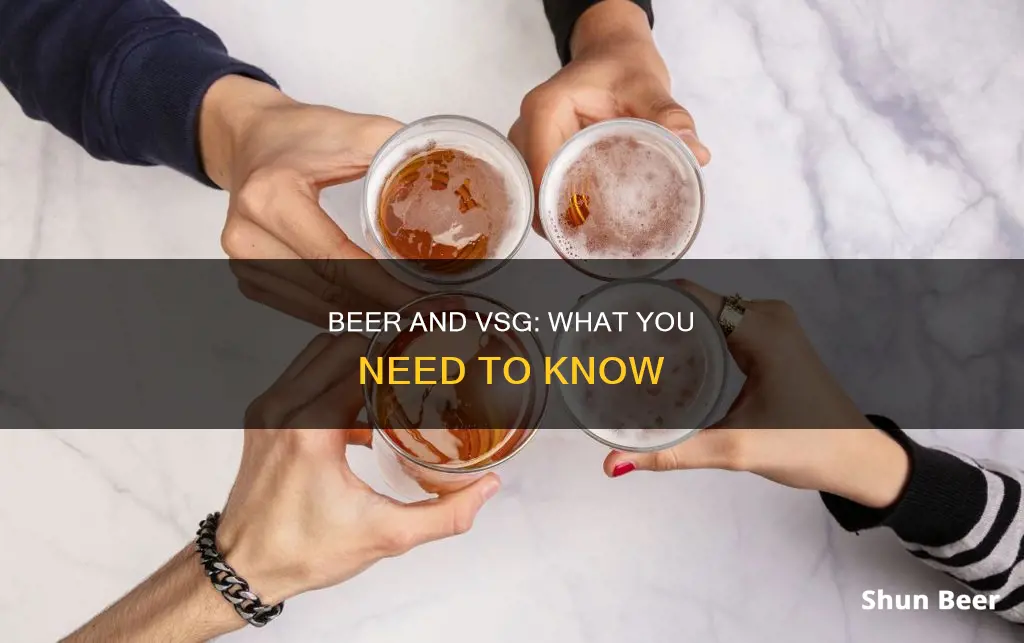
Drinking alcohol after bariatric surgery is not prohibited, but it should be approached with caution. It is recommended that you wait at least six months to a year after surgery before drinking, as this is when weight loss is most rapid and sensitivity to alcohol is heightened. Bariatric surgery changes how the body metabolises alcohol, so even a small amount can lead to rapid intoxication and low blood sugar. Alcohol is also high in calories and inhibits weight loss. It is best to stick to low-calorie options and avoid drinking on an empty stomach.
Can you drink beer after VSG?
| Characteristics | Values |
|---|---|
| Drinking alcohol after VSG | Not recommended during the first year after surgery |
| Alcohol absorption | Faster after surgery |
| Alcohol levels | Rise faster and stay raised longer after surgery |
| Calories in beer | High |
| Alcohol and weight loss | Alcohol inhibits the body's ability to burn fat for energy |
| Alcohol and liver | Excessive alcohol intake can harm the liver |
| Alcohol and gastric sleeve patients | A small percentage of patients develop alcohol use issues after surgery |
| Alcohol and gastric emptying | Alcohol empties the small intestine quicker |
| Alcohol and stomach stretching | Binge drinking accelerates stomach stretching |
| Alcohol and driving | Zero tolerance for drinking and driving for gastric patients |
What You'll Learn

Avoid drinking beer for at least six months after VSG
It is strongly recommended that individuals who have undergone vertical sleeve gastrectomy (VSG) refrain from consuming beer and other alcoholic beverages for a minimum of six months post-surgery. During this initial healing period, the body is highly sensitive to the effects of alcohol, and drinking can negatively impact wound healing and weight loss goals.
Reasons to Avoid Beer After VSG
- Healing and Recovery: Drinking alcohol soon after VSG can inhibit blood flow, disrupt proper wound healing, and increase the risk of leaks or infections. It is crucial to give your body time to heal and recover fully before introducing any alcoholic beverages.
- Altered Metabolism and Absorption: Bariatric surgery significantly alters metabolism and how the body absorbs alcohol. The body can now absorb alcohol more quickly, leading to faster intoxication and heightened sensitivity. Even small amounts of alcohol can result in low blood sugar (hypoglycemia), with symptoms like slurred speech, confusion, and loss of coordination.
- Nutritional Concerns: Alcohol is essentially empty calories, providing minimal nutritional value while inhibiting the absorption of essential nutrients like vitamins and minerals. This can compromise your nutritional status, especially when coupled with the dietary restrictions and reduced food intake after VSG.
- Weight Loss Goals: Alcohol can hinder weight loss progress. It is high in calories and can disrupt the body's ability to burn fat for energy. Additionally, drinking can lead to poor food choices, as alcohol impairs judgment and increases the inclination to consume fatty, fried, or sugary foods.
- Liver Health: Excessive alcohol consumption can harm the liver, and individuals who have undergone VSG may be more susceptible to liver problems due to altered liver function. Therefore, it is advisable to refrain from drinking to support liver health.
- Risk of Addiction: While only a small percentage of VSG patients develop alcohol use issues, the heightened sensitivity to alcohol may increase the risk of misuse or dependence. Additionally, individuals with a history of addiction may be at risk for addiction transfer, replacing food with alcohol as a source of comfort.
Tips for Reintroducing Alcohol
If you choose to reintroduce alcohol after the initial six-month period:
- Gradual Reintroduction: Start with small amounts and see how your body reacts. Your tolerance has likely decreased, and you may experience intoxication more quickly.
- Avoid Carbonation and Sugar: Opt for non-carbonated, low-sugar beverages. Carbonation can cause bloating and discomfort due to the reduced stomach size. Sugary drinks can further compromise your nutritional goals and weight loss efforts.
- Drink with Food: Consuming alcohol with food helps slow down absorption into the system. Drinking on an empty stomach can lead to nausea, vomiting, and other unpleasant side effects.
- Caloric Content Awareness: Be mindful of the caloric content of alcoholic beverages. Alcoholic drinks, especially those mixed with sugary ingredients, can be high in calories and hinder weight loss progress.
- Never Drink and Drive: With the altered absorption and metabolism of alcohol, it is easier to reach intoxication levels that impair your ability to drive safely. Always have a designated driver or alternative transportation arranged.
Breastfeeding and Beer: Is It Safe to Drink Alcohol?
You may want to see also

Alcohol will affect you differently post-surgery
Bariatric surgery changes the anatomy of your intestinal tract, which can alter your metabolism, including blood sugar and nutrient absorption. This means that your body does not process alcohol in the same way post-surgery as it did before.
Gastric Alcohol Dehydrogenase
Gastric Alcohol Dehydrogenase (GAD) is an enzyme found in stomach and liver cells. GAD is responsible for breaking down and metabolising alcohol, contributing to the rate at which alcohol is eliminated from the blood. Women have less of this enzyme than men, resulting in a lower alcohol tolerance.
Reduced Alcohol Tolerance
Following bariatric surgery, the small stomach pouch causes rapid emptying of liquids, increasing the absorption of alcohol. This means that you will be more sensitive to alcohol and can become intoxicated after only a single drink or, in some cases, a few sips.
Absorption and Metabolism
After bariatric surgery, the absorption and the body's ability to metabolise alcohol is greatly reduced. This means that alcohol will be absorbed directly into the bloodstream. As a result, it takes less alcohol to become intoxicated.
Drinking on an Empty Stomach
After bariatric surgery, you will be on a restricted-calorie diet and will be unable to eat the same quantities of food. This means that drinking on an empty stomach will affect you faster and more strongly.
Alcohol and Weight Loss
Alcohol prohibits the body's ability to burn fat for energy. When alcohol is present in the body, it focuses on ridding itself of the poison and detoxing rather than burning fat for fuel or metabolising food for energy. This means that food eaten with alcohol is more likely to be stored as body fat.
A Beginner's Guide to Joining a Beer Crawl
You may want to see also

Binge drinking can stretch the stomach and cause inadequate weight loss
Binge drinking can have several negative consequences after VSG, including inadequate weight loss due to stomach stretching. Firstly, it is important to understand that drinking alcohol after bariatric surgery is not recommended during the first six months to a year, as this is the period of rapid weight loss when the body is most sensitive to the effects of alcohol. During this time, alcohol should be avoided to achieve optimal weight loss.
After VSG, the stomach size is reduced to about one-sixth of its original size. Binge drinking can stretch the stomach and counteract the effects of the surgery. The stomach can become inflamed and swollen, leading to unpleasant side effects. Additionally, the absorption of alcohol is faster, causing intoxication more quickly and increasing the intensity and duration of intoxication. This can lead to accidental overconsumption and drunkenness with even small amounts of alcohol.
Furthermore, alcohol inhibits the absorption and usage of essential nutrients like folic acid and vitamins B12, B1, and B6. It is high in calories, providing 7.1 kcal per gram, compared to 4 kcal per gram for normal carbohydrates. This extra energy is addictive and can lead to weight gain. Alcohol also speeds up gastric emptying, causing the small intestine to empty quicker and leading to increased hunger and drunkenness.
To avoid inadequate weight loss and other complications, it is crucial to follow the recommended guidelines for drinking alcohol after VSG. This includes avoiding alcohol during the initial healing period, drinking in moderation, and being cautious of the caloric content of alcoholic beverages.
Beer Taxes: Effective or Just a Burden?
You may want to see also

Alcohol can cause nausea and vomiting after VSG
It is not uncommon to experience nausea and vomiting after drinking alcohol, and this is especially true after VSG. Vomiting is one of the body's protective reflexes against toxins. When you drink alcohol, your body breaks it down into acetaldehyde, a byproduct of alcohol. The liver usually neutralises acetaldehyde with a substance called glutathione. However, when you drink excessively, the liver cannot produce enough glutathione, and the body then resorts to vomiting to expel the excess acetaldehyde.
Alcohol also irritates the stomach lining, causing a buildup of acid that makes you feel more nauseated. This is further exacerbated by the fact that VSG patients have a much smaller stomach capacity, which means that alcohol is more concentrated in the stomach and can more easily lead to irritation and inflammation.
In addition, the absorption and metabolism of alcohol are greatly reduced after VSG, which can cause patients to feel intoxicated after only a small amount of alcohol. This means that VSG patients are more likely to experience nausea and vomiting after drinking, as they can reach the toxic threshold more quickly.
To avoid nausea and vomiting after drinking alcohol, it is important to drink in moderation, eat a meal beforehand, and be aware of your body's new tolerance for alcohol. If you do experience nausea, you can try ingesting ginger, lying down, or taking prescribed medications to alleviate the symptoms.
Beano and Beer: Does the Enzyme Work?
You may want to see also

Alcohol can lead to poor food choices
Alcohol can have a significant impact on the way your body functions, and this includes how you make food choices. Drinking alcohol can affect your inhibitions and increase your hunger and food cravings, often for junk food. This can be a problem for anyone, but if you've had bariatric surgery, it's even more important to be aware of how alcohol can affect your body and the decisions you make.
Alcohol and food choices
Alcohol can increase your hunger and food cravings. This is because alcohol temporarily increases serotonin levels, which play a role in controlling appetite. At the same time, alcohol lowers your inhibitions, making it more likely that you'll choose larger portions or less healthy foods than you would normally. Studies have shown that when people drink alcohol before or with meals, their food intake can increase by up to 30%.
Alcohol and junk food
Alcohol can also increase your desire for junk food, such as burgers, pizzas, and other foods that are high in salt, sugar, and fat. This effect can last into the next day, too, with many people experiencing cravings for junk food when they're hungover.
Alcohol and weight gain
The extra calories from alcohol and junk food can lead to weight gain, and this is made worse by the fact that alcohol is often burned by the body as a fuel source before anything else. This means that excess glucose and lipids are stored as fat. Alcohol also affects the way your body metabolises and stores carbohydrates and fats, which can make it harder to lose weight.
Alcohol and bariatric surgery
If you've had bariatric surgery, it's important to know that your body will process alcohol differently. Even a small amount of alcohol can lead to intoxication much more quickly than it would have before your surgery. This is because the surgery removes a large part of the stomach, which is where alcohol would usually be held and mixed with food and digestive enzymes, slowing down the release of alcohol into the small intestine. After bariatric surgery, alcohol goes straight to the small intestine and is absorbed directly into the bloodstream. This means that you'll feel the effects of alcohol much faster, and it takes less alcohol to make you feel intoxicated.
Recommendations
If you've had bariatric surgery, it's recommended that you avoid drinking alcohol for at least the first six months to a year after your surgery. This is when weight loss is most rapid and when you'll be most sensitive to the effects of alcohol. After this initial period, you can introduce alcohol back into your life, but it's important to do so slowly and carefully. Always eat a meal before you drink, and avoid drinking on an empty stomach. Stick to lower-calorie options and avoid drinks like beer and sugary cocktails.
To Drink or Not: Beer and Dental Fillings
You may want to see also
Frequently asked questions
It is recommended to wait at least six months to a year after VSG surgery before consuming any alcohol, including beer. This is to ensure your stomach has fully healed and to avoid complications with rapid weight loss.
Drinking alcohol on an empty stomach can lead to faster absorption of alcohol, resulting in quicker and more intense intoxication. It can also cause nausea and vomiting, which can be harmful after VSG surgery.
Drinking beer or any alcoholic beverage after VSG can have several risks, including:
- Faster weight gain due to the high-calorie content of alcohol.
- Poor food choices due to impaired judgment.
- Liver complications, as alcohol is a hepatotoxin (liver-damaging substance).
- Stretching of the stomach, which can hinder weight loss.
If you choose to drink beer after VSG, it is important to follow these guidelines:
- Always eat a meal before drinking and avoid drinking on an empty stomach.
- Be mindful of your caloric intake and choose lower-calorie beer options.
- Drink slowly and in moderation to avoid negative effects.
- Avoid carbonated drinks, as they can cause bloating and discomfort.







